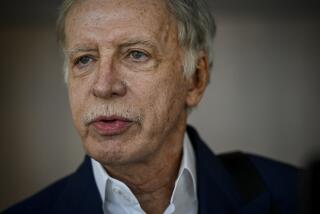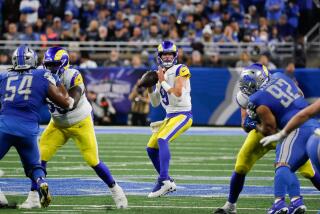Spreading NFL’s Sermon Overseas
- Share via
WEST BERLIN — Was ist American football?
Good question, that. It is asked often in this city. In hotel lobbies. On sidewalks. At shopping centers. If you have walked the streets of West Berlin, you have seen the faces of Jim Everett and Christian Okoye on the American Bowl ’90 handbills, each of them begging the query of the hour . . .
Was ist American football?
Berliners know it had better not be that sorry excuse for futbol the Americans sprung on poor Italy during this year’s World Cup. They can tell by the headgear protecting Everett and Okoye that it must be dangerous. And they wonder why anything called “football” allows Everett to pick up a small brown zeppelin and throw it far enough so someone else can catch it.
Zum Ersten Mal in Deutschland! For the first time in Germany. Fun, Food, Football. No translation needed there. If the first two are involved, Berliners are certain to follow suit. “Football is as much a part of the American Way of Life as cola, chewing gum and Cadillac,” the handbill explains. “Pro-Football in Amerika is no less than soccer is with us--dramatic, aggressive, sexy, intelligent, unsurpassable.”
Sexy?
At least one German copy writer has never seen Alvin Wright peel off his uniform after four hours of two-a-days in the middle of July.
The NFL is coming to West Berlin, to Olympic Stadium on Saturday, 54 years after Jesse Owens sacked Adolf Hitler’s master plan during the 1936 Summer Games. It is the Rams against the Kansas City Chiefs in a city that identifies only with West Germany over Argentina, with penalty kicks instead of penalty flags, with head shots instead of shots to the head.
It is expected to be a hard sell.
“Germans don’t care about football,” says Arnie Dedert, a Munich wire photographer, with a disgusted wave of his hand. “They only care about soccer and tennis and Boris Becker and Steffi Graf.
“They don’t know anything about the rules. Sometimes you can watch American football on private television, short little spots, maybe the Super Bowl final. But nobody knows about the players here in Germany. Nobody knows the Rams. Nobody knows the Chiefs.”
Dedert, in town to shoot Saturday’s game, has been forced to do some studying, much like the rest of the local media. “The only thing I know is what I have watched on television,” he says, “and what I have read about the track and field record-holder (former San Francisco 49er Renaldo Nehemiah) who started to play American football.”
The indifference isn’t the product of any anti-American sentiment. The National Basketball Assn., Dedert notes, is very popular in Germany.
“I think most people know American basketball--Michael Jordan, Kareem Abdul-Jabbar, Magic Johnson,” he says. “Basketball, you can play in school here. You can watch the games on television, on EuroSport or Super Channel, and you can understand.”
Not so with football.
“The rules are very difficult,” Dedert says. “When you show a repeat of American football, it is hard to explain the rules in a short television spot.”
There is an amateur football league in Berlin, the German Football Federation, but it was organized primarily for the benefit of the American soldiers stationed here. The professional World League will put a charter team in Frankfurt, but not until 1991.
For now, the NFL brand of ball remains a mystery.
Monday, the Rams and the Chiefs held a photo session at Olympic Stadium for the local media and curiosity filled the empty coliseum.
“Don’t you think it is crazy to fly over here in a big jumbo jet and play one game and then fly all the way home again?” Ram linebacker Brett Faryniarz was asked. A reasonable question. Faryniarz conceded that it was an inconvenience but that it was good to spread the word about this great American game.
Ram kicker Mike Lansford was less diplomatic when broaching the same matter.
“Why are we here?” Lansford mused. “We are here because the team is here--and the team is here because Georgia (Frontiere) owns the team and wanted the team to come here. We are not ambassadors.”
Another reporter wanted to know why the Rams now had “almost 100 players on the rooster,” but will soon have to cut down to 47. “What do they do after they are cut?”
Said Lansford: “They become bankers and lawyers and frustrated sportswriters and TV broadcasters.”
Everett was a popular interview subject and money was a popular topic. One TV reporter came quickly to the point. “What is your salary, because our listeners will be very interested to compare with that of our top soccer stars?”
Everett grinned a $14 million grin.
“It’s very comparable,” he said.
Eventually, the Rams broke away for their first workout on German soil and Peter Harnisch, a West Berlin police lieutenant assigned to escort the team, stood on the sidelines, transfixed. “I’m amazed,” Harnisch said. “I had some chances to watch it before, on multi-system television, but I didn’t catch anything about it. I read books about it to try to learn about it. Now is my first chance to watch in person.
“I’m amazed about the ‘big guys,’ as I call them, and how flexible they are. When you read, it is just theoretical stuff, difficult to understand. It is much easier to watch the training.”
Still, Harnisch remains skeptical about the motivation behind American Bowl ’90.
“They are here for the money,” he said, frowning. “I know it is worldwide in all sports, but I don’t think money is the right reason to bring football here.”
Harnisch obviously needs to read more. The NFL doesn’t fly two teams, two coaching staffs and two entourages halfway around the world just for the missionary zeal of it, just so the pagans can be enriched by the gospel according to Knute Rockne.
The NFL wants to spread the word because it wants to spread the wealth. American Bowl ’90 is intended to create European interest, which is intended to create European merchandising, which is intended to create American Bonanza ’91.
That ist American football.
More to Read
Go beyond the scoreboard
Get the latest on L.A.'s teams in the daily Sports Report newsletter.
You may occasionally receive promotional content from the Los Angeles Times.










